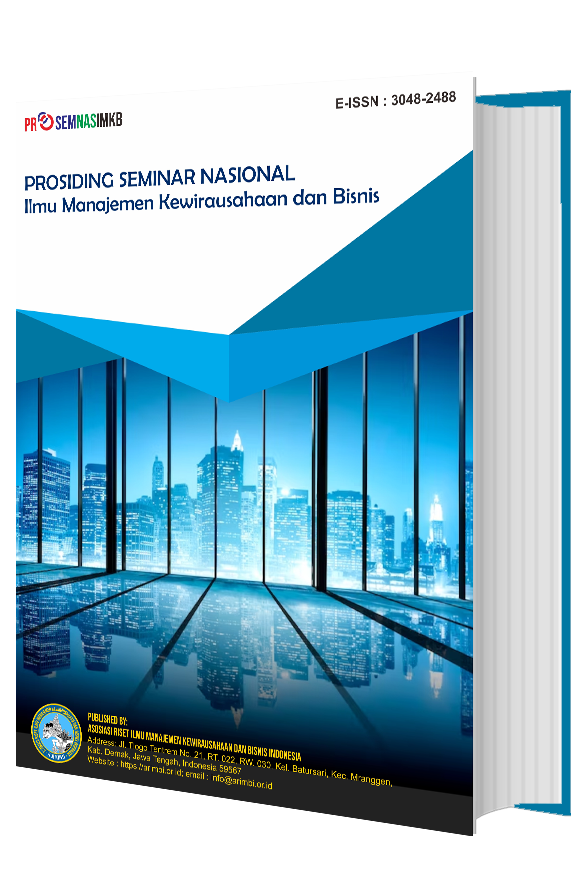Merajut Asa di Era VUCA : Tinjauan Literatur Mengenai Peran Pendidikan Kewirausahaan Digital
DOI:
https://doi.org/10.61132/prosemnasimkb.v2i1.165Keywords:
digital entrepreneurship education, literature review, VUCA eraAbstract
The VUCA era (volatility, uncertainty, complexity, ambiguity) requires education systems to equip young people with adaptive, creative, and resilient competencies. One strategic response to this challenge is digital entrepreneurship education. This study reviews academic literature from 2015 to 2025 to explore how digital entrepreneurship education contributes to addressing the dynamics of the VUCA era. Using a literature review approach, sources were gathered from the Scopus database and selected based on relevance. The analysis, conducted descriptively and qualitatively, identifies key findings. The results show that digital entrepreneurship education supports the development of student resilience and adaptability, offers practical experiences through digitalized and project-based learning, and fosters entrepreneurial intention. However, challenges remain, including limited integration of entrepreneurial values and digital ethics, unequal access to technology, educator readiness, and weak cross-sector collaboration. This review highlights the need for innovation in teaching approaches grounded in constructivist pedagogy, along with stronger synergy between education, industry, and technology. When guided strategically and inclusively, digital entrepreneurship education holds strong potential to prepare the next generation for an uncertain and fast-changing world.
Downloads
References
Abbas, I., & Ali, U. A. (2023). Impact of Employer Branding, Social Media Marketing & EWOM on Consumer Online Purchase Intention with Mediation of Brand Trust. International Journal of Trends and Innovations in Business & Social Sciences, 1(3), 100–110. https://doi.org/10.48112/tibss.v1i3.645
Alzahrani, S., & Bhunia, A. K. (2024). A serial mediation model of the relationship between digital entrepreneurial education, alertness, motivation, and intentions. Sustainability, 16(20), 8858. https://doi.org/10.3390/su16208858
Atanassova, I., Bednar, P., Khan, H., & Khan, Z. (2025). Managing the VUCA environment: The dynamic role of organizational learning and strategic agility in B2B versus B2C firms. Industrial Marketing Management, 125, 12–28. https://doi.org/10.1016/j.indmarman.2024.12.008
Bachmann, N., Rose, R., Maul, V., & Hölzle, K. (2024). What makes for future entrepreneurs? The role of digital competencies for entrepreneurial intention. Journal of Business Research, 174, 114481. https://doi.org/10.1016/j.jbusres.2023.114481
Creely, E., Henriksen, D., Crawford, R., & Henderson, M. (2021). Exploring creative risk-taking and productive failure in classroom practice. A case study of the perceived self-efficacy and agency of teachers at one school. Thinking Skills and Creativity, 42, 100951. https://doi.org/10.1016/j.tsc.2021.100951
Dai, K., Jiao, H., Wang, H., & He, L. (2024). Application and effect analysis of virtual reality technology in innovation and entrepreneurship education. Applied Mathematics and Nonlinear Sciences, 9(1), 20241614. https://doi.org/10.2478/amns-2024-1614
Dudley, D. A. (2025). Educating character through quality physical education: A pedagogical model. Quest, 1–18. https://doi.org/10.1080/00336297.2025.2473423
Duong, C. D., Nguyen, T. H., Chu, T. V., Pham, T. V., & Do, N. D. (2024). Whether ChatGPT adoption inspires higher education students’ digital entrepreneurial intention? An integrated model of the SCCT and the TPB. International Journal of Innovation Science. https://doi.org/10.1108/IJIS-01-2024-0020
Dwivedi, Y. K., Sharma, A., Rana, N. P., Giannakis, M., Goel, P., & Dutot, V. (2023). Evolution of artificial intelligence research in Technological Forecasting and Social Change: Research topics, trends, and future directions. Technological Forecasting and Social Change, 192, 122579. https://doi.org/10.1016/j.techfore.2023.122579
Li, S., Bu, Y., Zhang, Z., & Huang, Y. (2024). Digital entrepreneurship intention and digital entrepreneurship behavior: The mediating role of managing learning and entrepreneurship education. Education + Training, 66(2/3), 195–212. https://doi.org/10.1108/ET-05-2023-0176
Linzalone, R., Schiuma, G., & Ammirato, S. (2020). Connecting universities with entrepreneurship through digital learning platform: Functional requirements and education-based knowledge exchange activities. International Journal of Entrepreneurial Behavior & Research, 26(7), 1525–1545. https://doi.org/10.1108/IJEBR-07-2019-0434
Ma, H., Lang, C., Liu, Y., & Gao, Y. (2020). Constructing a hierarchical framework for assessing the application of big data technology in entrepreneurship education. Frontiers in Psychology, 11, 551389. https://doi.org/10.3389/fpsyg.2020.551389
Rashid, L. (2019). Entrepreneurship education and sustainable development goals: A literature review and a closer look at fragile states and technology-enabled approaches. Sustainability, 11(19), 5343. https://doi.org/10.3390/su11195343
Rasimin, Semma, A. B., Zakiyuddin, Ali, M., & Helmy, M. I. (2024). Multi-dimensional challenges in the Indonesian social science information technology-based learning: A systematic literature review. Heliyon, 10(7), e28706. https://doi.org/10.1016/j.heliyon.2024.e28706
Satar, M. S., Alharthi, S., Omeish, F., Alshibani, S. M., & Saqib, N. (2024). Digital learning orientation and entrepreneurial competencies in graduates: Is blended learning sustainable? Sustainability, 16(17), 7794. https://doi.org/10.3390/su16177794
Snyder, H. (2019). Literature review as a research methodology: An overview and guidelines. Journal of Business Research, 104, 333–339. https://doi.org/10.1016/j.jbusres.2019.07.039
Syed M. Afraz Hassan Gillani, Senin, A. B. A., Bode, J., Muniba, & Gillani, S. M. A. H. (2022). Bibliometric analysis of digital entrepreneurial education and student intention; Reviewed and analyzed by VOSViewer from Google Scholar. International Journal of Interactive Mobile Technologies (iJIM), 16(13), 48–65. https://doi.org/10.3991/ijim.v16i13.30619
Udekwe, E., & Iwu, C. G. (2024). The nexus between digital technology, innovation, entrepreneurship education, and entrepreneurial intention and entrepreneurial motivation: A systematic literature review. Education Sciences, 14(11), 1211. https://doi.org/10.3390/educsci14111211
Weng, X., Gu, M. M., Xia, Q., & Chiu, T. K. F. (2025). SWOT analysis of AI empowered entrepreneurship education: Insights from digital learners in higher education. Thinking Skills and Creativity, 56, 101763. https://doi.org/10.1016/j.tsc.2025.101763
Wibowo, A., Narmaditya, B. S., Saptono, A., Effendi, M. S., Mukhtar, S., & Mohd Shafiai, M. H. (2023). Does digital entrepreneurship education matter for students’ digital entrepreneurial intentions? The mediating role of entrepreneurial alertness. Cogent Education, 10(1), 2221164. https://doi.org/10.1080/2331186X.2023.2221164
Xin, B., & Ma, X. (2023). Gamifying online entrepreneurship education and digital entrepreneurial intentions: An empirical study. Entertainment Computing, 46, 100552. https://doi.org/10.1016/j.entcom.2023.100552
Zhou, Z., Ironsi, C. S., & Chune, R. (2025). Leveraging interactive digital tools for online business education: Improving academic performances. The International Journal of Management Education, 23(2), 101135. https://doi.org/10.1016/j.ijme.2025.101135
Downloads
Published
How to Cite
Issue
Section
License
Copyright (c) 2025 Prosiding Seminar Nasional Ilmu Manajemen Kewirausahaan dan Bisnis

This work is licensed under a Creative Commons Attribution-ShareAlike 4.0 International License.






